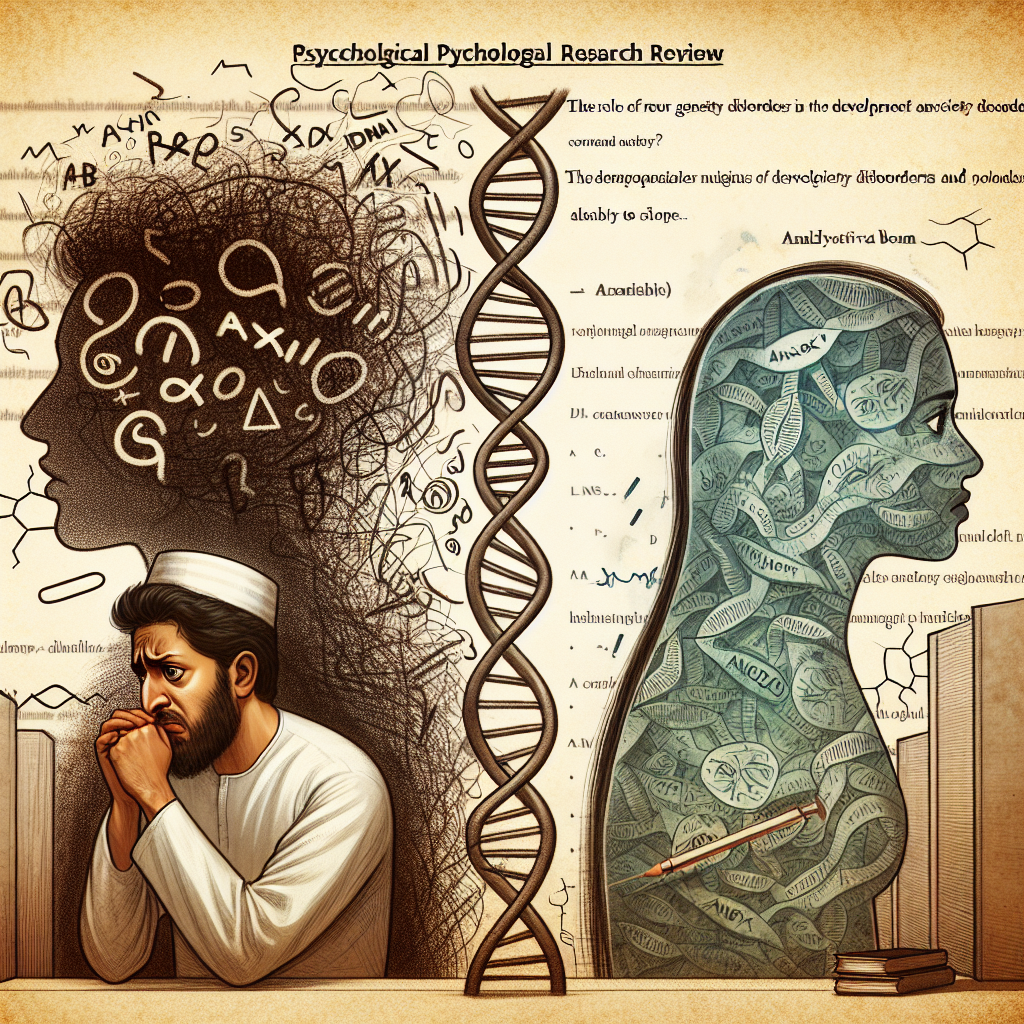Anxiety disorders are among the most common mental health conditions, affecting millions of people worldwide. These disorders can be debilitating, impacting individuals’ daily functioning and quality of life. While environmental factors and life experiences play a significant role in the development of anxiety disorders, recent research has shown that genetics also play a crucial role in predisposing individuals to these conditions. This article will review the current psychological research on the role of genetics in the development of anxiety disorders, exploring how genetic factors contribute to the risk of developing these disorders and what implications this has for treatment and prevention.
Genetics and Anxiety Disorders: A Brief Overview
Anxiety disorders are a group of mental health conditions characterized by excessive and persistent feelings of fear, worry, and nervousness. These disorders can manifest in various forms, including generalized anxiety disorder, panic disorder, social phobia, and specific phobias. While the exact causes of anxiety disorders are not fully understood, research has shown that both genetic and environmental factors play a role in their development.
Genetic factors have gained increasing attention in recent years as researchers have identified specific genes that may be associated with an increased risk of developing anxiety disorders. Studies have shown that individuals with a family history of anxiety disorders are more likely to develop these conditions themselves, suggesting a genetic component to the disorder. In addition, twin studies have shown a higher concordance rate for anxiety disorders in monozygotic twins compared to dizygotic twins, further supporting the role of genetics in these conditions.
Genetic Risk Factors for Anxiety Disorders
Several genes have been identified as potential risk factors for the development of anxiety disorders. One of the most well-studied genes is the serotonin transporter gene (SLC6A4), which is involved in the regulation of serotonin, a neurotransmitter that plays a crucial role in mood regulation. Variations in this gene have been associated with an increased risk of developing anxiety disorders, particularly panic disorder and social phobia.
Another gene that has been implicated in the development of anxiety disorders is the COMT gene, which encodes for an enzyme that breaks down dopamine, another neurotransmitter involved in mood regulation. Variations in this gene have been associated with an increased risk of developing anxiety disorders, particularly generalized anxiety disorder and obsessive-compulsive disorder.
Other genes that have been linked to anxiety disorders include the BDNF gene, which is involved in the growth and development of neurons in the brain, and the GAD1 gene, which is involved in the production of the neurotransmitter gamma-aminobutyric acid (GABA), which plays a role in anxiety regulation.
While these genetic risk factors have been identified, it is important to note that genetics alone do not determine the development of anxiety disorders. Environmental factors, such as childhood trauma, stress, and life experiences, also play a significant role in the onset of these disorders. It is likely that a complex interplay between genetic and environmental factors contributes to the risk of developing anxiety disorders.
Implications for Treatment and Prevention
The identification of genetic risk factors for anxiety disorders has important implications for treatment and prevention. Understanding the genetic basis of these disorders can help researchers develop more targeted and personalized treatments for individuals with anxiety disorders. For example, individuals with specific genetic variations may benefit from certain medications or therapies that target the underlying biological mechanisms of their disorder.
In addition, identifying genetic risk factors for anxiety disorders can help clinicians identify individuals who may be at a higher risk of developing these conditions and implement early interventions to prevent the onset of the disorder. By screening individuals for genetic risk factors, healthcare providers can identify high-risk individuals and provide them with targeted interventions to reduce their risk of developing anxiety disorders.
FAQs
Q: Can anxiety disorders be inherited?
A: Yes, research has shown that genetic factors play a significant role in the development of anxiety disorders. Individuals with a family history of anxiety disorders are more likely to develop these conditions themselves, suggesting a genetic predisposition to the disorder.
Q: Can genetic testing predict the risk of developing anxiety disorders?
A: While genetic testing can identify certain genetic risk factors for anxiety disorders, it is not a definitive predictor of risk. Genetic testing can provide valuable information about an individual’s genetic susceptibility to anxiety disorders, but environmental factors also play a significant role in the development of these conditions.
Q: Can anxiety disorders be prevented through genetic interventions?
A: While genetic interventions may have the potential to reduce the risk of developing anxiety disorders in high-risk individuals, more research is needed to determine the effectiveness of such interventions. Environmental factors also play a significant role in the development of anxiety disorders, so a multi-faceted approach that addresses both genetic and environmental factors may be more effective in preventing these conditions.
In conclusion, genetics play a significant role in the development of anxiety disorders, with specific genes implicated in the risk of developing these conditions. Understanding the genetic basis of anxiety disorders can help researchers develop more targeted treatments and interventions for individuals with these disorders. By considering both genetic and environmental factors, healthcare providers can better identify individuals at risk of developing anxiety disorders and implement early interventions to prevent the onset of these debilitating conditions.




Leave A Comment